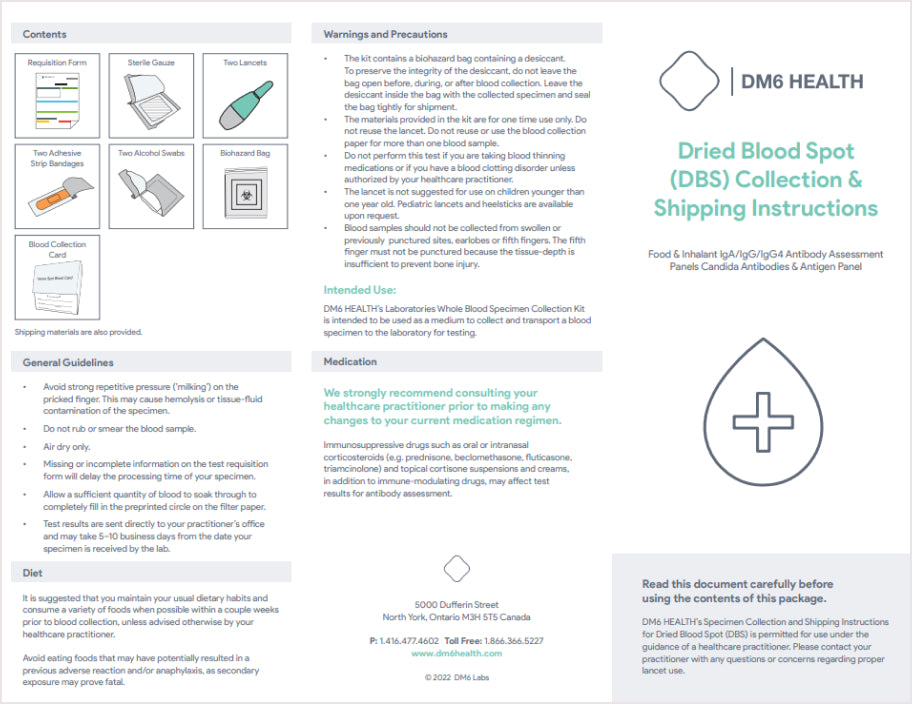
Our labs are :
.png?v=134991182274568218411663756760)
Same Labs as
Physicians & Hospitals

Confidential Results
Within 10 Days

Free
Shipping

Discreet
Packaging

All payments
Accepted
TEST DETAILS

Measures your IgE antibody reactivity to 36 common environmental allergens
IgE antibodies are normally found in small amounts in your blood. But when you have an allergy, your immune system releases too many IgE antibodies when exposed to a specific inhalant.
This test may be right for you if you: Have experienced mild symptoms but haven’t been diagnosed with a food allergy, which may include:
- Tingling or itching of your face, lips, mouth, tongue, or throat
- Itchy or watery eyes
- Hives or skin rash, or itchy skin
- Runny nose, sneezing, congestion
- Have a parent or sibling who has a known allergic condition
Is this Test Right for Me
Testing alone cannot be used to diagnose a medical condition. Your healthcare provider will use your test results, in combination with your symptoms, medical history, family history, and physical exam, to determine the appropriate next steps for evaluation and treatment.
Each inhalant will be rated on a Class scale of 0-5:
Class 0 (normal reactivity) to Class 5 (high reactivity). A higher than normal IgE reactivity level can mean that there’s a possibility that inhalent can be giving you symptoms. Aeroallergens from trees, grasses, mold, dust, and others can produce symptoms that range from minor to severe in affected individuals.
Grasses
Weeds
Trees
Molds
CCD Marker
You should take this test if you suffer from:

What’s included in the package:
Lancets
Return Label
and EnvelopeBandage
Biohazard Bag
Alcohol pad
Blood spot card
View the tutorial video on how to collect your sample(s).
- Dried Blood Spot Collection
How DM6 works
Blood Sample
Saliva Sample
Purchase
your DM6 test kit

Standby as you test kit will be shipped within 24 hours of your purchase
Collect
your sample

Please follow the instruction manual provided. Your quick at-home collection is all we need to do a thorough lab analysis.
Mail
your sample

Simply place your sample in the packaging provided and send it to our approved lab — the shipping costs are on us
Review
your results

Get first hand access to your invaluable health data. View your results and recommendations online. Knowledge is power!
With Every Test Kit You Will Also Receive


Physician reviewed results


Pre-Paid Shipping both ways


All material for sample collection and shipping back to the lab


Detailed direction and an instructional video to guide you


Help along the way from our customer care team


Digital and printable results you may share with family and/or your health provider
Testing for IgE inhalant antibodies is useful for individuals who suspect that they are reacting to an environmental stimulus. Household inhalants include cat and dog dander, cockroach, and mites. Outdoor inhalants include trees, grasses, weeds, and molds, and may bloom or pollinate at various times depending on the region.
Symptoms and conditions associated with environmental allergies are:
Trusted By 10,000
Customers Around
The World

Customer Reviews
Frequently Asked Questions
How long will it take for me to receive my results?
Results are typically sent within 7-10 business days from the time we receive your sample.
Who can order a DM6 Health test?
This test is only for adults aged 18 and older. The test can only be ordered within Canada.
Does my insurance cover DM6 tests?
Some insurance may cover DM6 Health Test. Please check with your provider first. A receipt will be provided to submit to your insurance. Typically patients with HCSA will cover it.
How long will it take for my order to arrive?
Orders are processed for shipping within 24 hours from the time they are received. Please allow 4-5 business days for your order to arrive.
Do You Offer Refunds?
If a test was purchased on dm6health.com and your order hasn’t shipped, we can offer a full refund upon request. If your order has already shipped, we can offer a full refund minus $30.00 to cover shipping and handling fees. In addition, if you notify us that a submitted test was used by a minor before our lab begins processing, we can offer a refund minus $30.00. If we discover that an account was created and contains results from a minor, we will remove the account within 24 hours and no refund will be issued. For any other questions regarding this policy, please feel free to contact our Customer Care Team at info@dm6health.com.com
What should I do if I think I am having an allergic reaction?
If you are having a severe allergic reaction please contact 911. This test is to determine what allergies you have prior to having any allergic reactions.
What does inhalant allergy mean?
Although airborne allergies are caused by harmless things, your body identifies these substances as “foreign.” This leads to your allergy symptoms—sneezing, congestion, runny nose, and more. Inhalant allergies commonly include indoor allergens (such as dust mites) and outdoor allergens (such as pollen and mold).
Who should take the Environmental Allergy Test?
This test may be right for you if you:
- Have experienced mild symptoms but haven’t been diagnosed with an inhalent allergy
- Have a family member who has experienced mild or severe symptoms before.
- Precautionary
What does a positive IgE test mean?
A total IgE test result that is high means that you may have some kind of allergy. But the results of a total IgE test don't show what you're allergic to or how serious your allergy may be. A specific IgE test result that is high means that you may be allergic to the allergen that was tested
When should testing for IgE Inhalant Antibodies be considered?
Testing for IgE inhalant antibodies is useful for individuals who suspect that they are reacting to an environmental stimulus. Household inhalants include cat and dog dander, cockroach, and mites. Outdoor inhalants include trees, grasses, weeds, and molds, and may bloom or pollinate at various times depending on the region.
An IgE allergic response involves immediate-hypersensitivity to a substance. It is important to test when the patient is symptomatic. Circulating IgE antibodies have a short half-life of around 1-2 days, and will only be produced after exposure to the substance. The presence of circulating antibodies may affect each patient differently. According to the American Academy of Allergy, Asthma, and Immunology, "A key message is that a positive allergy test result (skin or blood) indicates only the presence of allergen-specific IgE (called sensitization). It does not necessarily mean clinical allergy (i.e., allergic symptoms with exposure)."1 Therefore, test results should always be viewed in the context of the overall clinical picture.
What are the symptoms and conditions associated with IgE inhalant allergies?
- Stuffy or itchy nose, sneezing, rhinitis or sinusitis
- Itchy, teary eyes, conjunctivitis
- Cough, shortness of breath, wheezing, asthma
- Skin rash or hives
What’s the connection between IgE antibodies and allergic symptoms?
When your body produces too many IgE antibodies to specific foods, you may be at higher risk of having allergic symptoms. Allergic symptoms differ from person to person and can range from mild to severe and may include:
- Itching
- Hives
- Swelling
- Diarrhea
- Wheezing or anaphylaxis
(which can lead to tightened airways and difficulty breathing and potentially be life-threatening) *This test is not intended to be taken by anyone who has previously had a severe reaction to the foods on this panel. If you’re having any serious symptoms, please seek medical attention right away.
IgE antibodies detected in your blood do not correlate directly to the symptoms you may experience, but higher IgE antibody levels may mean you have a higher likelihood of having a food allergy. Not all individuals with high IgE reactivity to a particular food will experience an allergic reaction to that food. Similarly, it is possible to have low or negative levels of IgE reactivity and still have a severe allergy to that food. It’s important to share your results with your healthcare provider for use in the food allergy evaluation process.
Testing alone cannot be used to diagnose a food allergy. Your healthcare provider will use your test results, in combination with your symptoms, medical history, family history, and physical exam, to determine the likelihood of a food allergy and the right next steps for evaluation and treatment (e.g., oral immunotherapy).
What advantage does the IgE Inhalants Profile offer compared to other diagnostics?
Identifying airborne allergens can be difficult and testing serum allergen-specific IgE antibodies is helpful. Allergen-specific serum IgE testing does not involve introducing an allergen in order to test. Instead, already circulating antibodies are measured, however, the patient must have been exposed to the allergen in the days leading up to testing in order to detect antibodies. A skin-prick test involves the injection of an allergen on the skin then observation for a reaction. Serum testing can be especially useful when skin-prick tests cannot be performed for example, due to extensive dermatitis or dermatographism, when antihistamines cannot be discontinued, or those with a history of anaphylactic reaction
How does this test compare to the one performed in the doctor’s office?
DM6 Health’s Environmental Allergy Test measures immunoglobulin E (IgE) antibody response to 36 common inhalant allergens.
The instruments and methods used by our laboratories are similar to - and often exactly the same as - those used by a doctor’s office. Our at-home sample collection methods, like dried blood spot and saliva, have been widely used for decades. All of the laboratories with whom we partner have performed millions of tests and are considered industry leaders. These labs perform frequent internal quality controls and testing. They are also checked through third-party testing, which validates the accuracy of the lab’s testing. In general, types of food allergy testing include:
- Serology IgE food allergy testing (this test). This blood test checks for an antibody called immunoglobulin E (IgE). The results of this test alone are not enough to diagnose or rule out a food allergy, but where your value falls on the scale of very low to very high may be useful for your healthcare provider in determining next steps. This type of testing can be helpful for individuals who have skin issues such as eczema or for individuals who routinely take antihistamines, given its impact on skin prick testing.
- A skin prick test, where a small amount of food extract is placed on your skin and then lightly pricked. This skin test should be performed under the supervision of an allergy specialist familiar with the tests and trained in emergency treatment options should an anaphylactic reaction occur.
- A physician-supervised oral food challenge, where you eat the food allergen in increasing amounts under the supervision of an allergy specialist. This test should be performed under the supervision of an allergy specialist familiar with the tests and trained in emergency treatment options should an anaphylactic reaction occur. An oral food challenge is the gold standard of food allergy testing.









